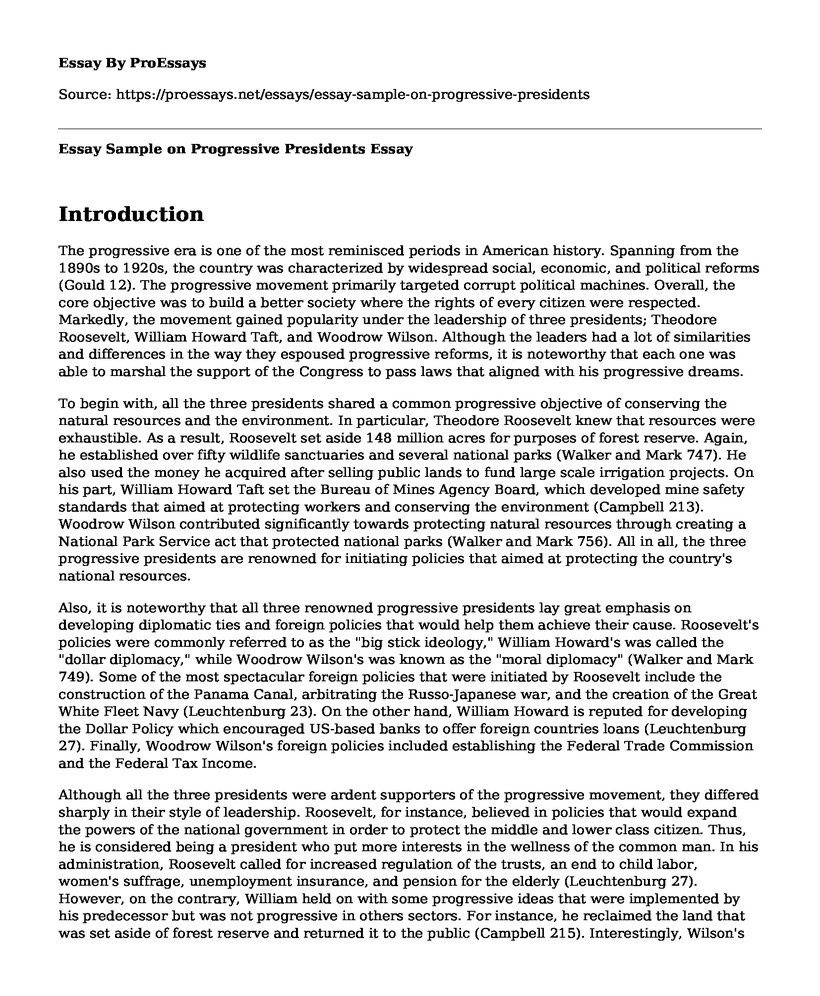Introduction
The progressive era is one of the most reminisced periods in American history. Spanning from the 1890s to 1920s, the country was characterized by widespread social, economic, and political reforms (Gould 12). The progressive movement primarily targeted corrupt political machines. Overall, the core objective was to build a better society where the rights of every citizen were respected. Markedly, the movement gained popularity under the leadership of three presidents; Theodore Roosevelt, William Howard Taft, and Woodrow Wilson. Although the leaders had a lot of similarities and differences in the way they espoused progressive reforms, it is noteworthy that each one was able to marshal the support of the Congress to pass laws that aligned with his progressive dreams.
To begin with, all the three presidents shared a common progressive objective of conserving the natural resources and the environment. In particular, Theodore Roosevelt knew that resources were exhaustible. As a result, Roosevelt set aside 148 million acres for purposes of forest reserve. Again, he established over fifty wildlife sanctuaries and several national parks (Walker and Mark 747). He also used the money he acquired after selling public lands to fund large scale irrigation projects. On his part, William Howard Taft set the Bureau of Mines Agency Board, which developed mine safety standards that aimed at protecting workers and conserving the environment (Campbell 213). Woodrow Wilson contributed significantly towards protecting natural resources through creating a National Park Service act that protected national parks (Walker and Mark 756). All in all, the three progressive presidents are renowned for initiating policies that aimed at protecting the country's national resources.
Also, it is noteworthy that all three renowned progressive presidents lay great emphasis on developing diplomatic ties and foreign policies that would help them achieve their cause. Roosevelt's policies were commonly referred to as the "big stick ideology," William Howard's was called the "dollar diplomacy," while Woodrow Wilson's was known as the "moral diplomacy" (Walker and Mark 749). Some of the most spectacular foreign policies that were initiated by Roosevelt include the construction of the Panama Canal, arbitrating the Russo-Japanese war, and the creation of the Great White Fleet Navy (Leuchtenburg 23). On the other hand, William Howard is reputed for developing the Dollar Policy which encouraged US-based banks to offer foreign countries loans (Leuchtenburg 27). Finally, Woodrow Wilson's foreign policies included establishing the Federal Trade Commission and the Federal Tax Income.
Although all the three presidents were ardent supporters of the progressive movement, they differed sharply in their style of leadership. Roosevelt, for instance, believed in policies that would expand the powers of the national government in order to protect the middle and lower class citizen. Thus, he is considered being a president who put more interests in the wellness of the common man. In his administration, Roosevelt called for increased regulation of the trusts, an end to child labor, women's suffrage, unemployment insurance, and pension for the elderly (Leuchtenburg 27). However, on the contrary, William held on with some progressive ideas that were implemented by his predecessor but was not progressive in others sectors. For instance, he reclaimed the land that was set aside of forest reserve and returned it to the public (Campbell 215). Interestingly, Wilson's approach was more inclined towards commercial accomplishments rather than the people's wellbeing. Indeed, this explains why as soon as he ascended to the presidency he set to tackle issues of tariffs, banks, and the trusts. He believed entrepreneurship was the tenet of a successful economy.
Conclusion
Overall, it thus can be seen that each president was successful in his progressive way. Roosevelt's is mostly credited for creating wildlife parks, dams, trust-busting, women suffrage, building the Panama Canal, arbitrating the Russo-Japanese war, and the creation of the Great White Fleet Navy. William developed anti-trust laws that saw over 90 trusts being busted during his tenure, created the Dollar Policy, oversaw the ruling of the US in Philippian, and established a national postal saving system. Finally, Wilson spearheaded the Federal Trade Commission and the Federal Tax Income as well as tackling issues of tariffs, banks, and the trusts
Works Cited
Campbell, Ballard C. "William Howard Taft: The Travails of a Progressive Conservative." Presidential Studies Quarterly45.1 (2015): 214.
Gould, Lewis L. America in the progressive era, 1890-1914. Routledge, 2014.
Leuchtenburg, William E. "Progressivism and Imperialism: The Progressive Movement and American Foreign Policy, 1898-1916." The Mississippi Valley Historical Review 39.3 (1952): 483-504.
Walker, Stephen G., and Mark Schafer. "Theodore Roosevelt and Woodrow Wilson as cultural icons of US foreign policy." Political Psychology 28.6 (2007): 747-776.
Cite this page
Essay Sample on Progressive Presidents. (2022, Nov 15). Retrieved from https://proessays.net/essays/essay-sample-on-progressive-presidents
If you are the original author of this essay and no longer wish to have it published on the ProEssays website, please click below to request its removal:
- Planned Parenthood Interest Group Essay
- Domestic Abuse Among Teenagers Research Paper
- Blacks and the Constitution Essay Example
- Paper Example on Multicultural Experience
- Buying American: The US Policy of Protectionism - Essay Sample
- Report Sample on the U.S. Healthcare System: A Complex Network of Providers and Regulators
- Essay Sample on Electoral College System Should Be Banned







